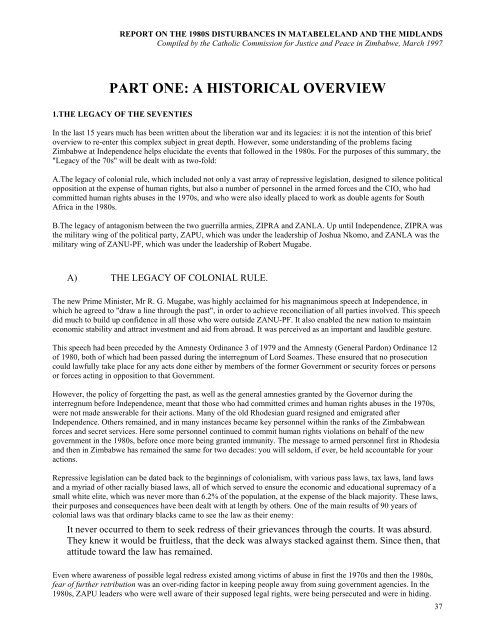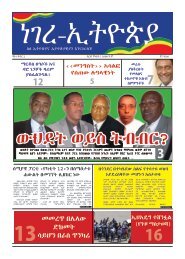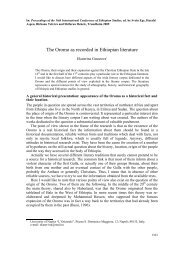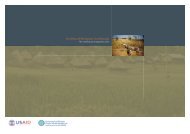MatabelelandReport
MatabelelandReport
MatabelelandReport
Create successful ePaper yourself
Turn your PDF publications into a flip-book with our unique Google optimized e-Paper software.
REPORT ON THE 1980S DISTURBANCES IN MATABELELAND AND THE MIDLANDS<br />
Compiled by the Catholic Commission for Justice and Peace in Zimbabwe, March 1997<br />
PART ONE: A HISTORICAL OVERVIEW<br />
1.THE LEGACY OF THE SEVENTIES<br />
In the last 15 years much has been written about the liberation war and its legacies: it is not the intention of this brief<br />
overview to re-enter this complex subject in great depth. However, some understanding of the problems facing<br />
Zimbabwe at Independence helps elucidate the events that followed in the 1980s. For the purposes of this summary, the<br />
"Legacy of the 70s" will be dealt with as two-fold:<br />
A.The legacy of colonial rule, which included not only a vast array of repressive legislation, designed to silence political<br />
opposition at the expense of human rights, but also a number of personnel in the armed forces and the CIO, who had<br />
committed human rights abuses in the 1970s, and who were also ideally placed to work as double agents for South<br />
Africa in the 1980s.<br />
B.The legacy of antagonism between the two guerrilla armies, ZIPRA and ZANLA. Up until Independence, ZIPRA was<br />
the military wing of the political party, ZAPU, which was under the leadership of Joshua Nkomo, and ZANLA was the<br />
military wing of ZANU-PF, which was under the leadership of Robert Mugabe.<br />
A) THE LEGACY OF COLONIAL RULE.<br />
The new Prime Minister, Mr R. G. Mugabe, was highly acclaimed for his magnanimous speech at Independence, in<br />
which he agreed to "draw a line through the past", in order to achieve reconciliation of all parties involved. This speech<br />
did much to build up confidence in all those who were outside ZANU-PF. It also enabled the new nation to maintain<br />
economic stability and attract investment and aid from abroad. It was perceived as an important and laudible gesture.<br />
This speech had been preceded by the Amnesty Ordinance 3 of 1979 and the Amnesty (General Pardon) Ordinance 12<br />
of 1980, both of which had been passed during the interregnum of Lord Soames. These ensured that no prosecution<br />
could lawfully take place for any acts done either by members of the former Government or security forces or persons<br />
or forces acting in opposition to that Government.<br />
However, the policy of forgetting the past, as well as the general amnesties granted by the Governor during the<br />
interregnum before Independence, meant that those who had committed crimes and human rights abuses in the 1970s,<br />
were not made answerable for their actions. Many of the old Rhodesian guard resigned and emigrated after<br />
Independence. Others remained, and in many instances became key personnel within the ranks of the Zimbabwean<br />
forces and secret services. Here some personnel continued to commit human rights violations on behalf of the new<br />
government in the 1980s, before once more being granted immunity. The message to armed personnel first in Rhodesia<br />
and then in Zimbabwe has remained the same for two decades: you will seldom, if ever, be held accountable for your<br />
actions.<br />
Repressive legislation can be dated back to the beginnings of colonialism, with various pass laws, tax laws, land laws<br />
and a myriad of other racially biased laws, all of which served to ensure the economic and educational supremacy of a<br />
small white elite, which was never more than 6.2% of the population, at the expense of the black majority. These laws,<br />
their purposes and consequences have been dealt with at length by others. One of the main results of 90 years of<br />
colonial laws was that ordinary blacks came to see the law as their enemy:<br />
It never occurred to them to seek redress of their grievances through the courts. It was absurd.<br />
They knew it would be fruitless, that the deck was always stacked against them. Since then, that<br />
attitude toward the law has remained.<br />
Even where awareness of possible legal redress existed among victims of abuse in first the 1970s and then the 1980s,<br />
fear of further retribution was an over-riding factor in keeping people away from suing government agencies. In the<br />
1980s, ZAPU leaders who were well aware of their supposed legal rights, were being persecuted and were in hiding.<br />
37







